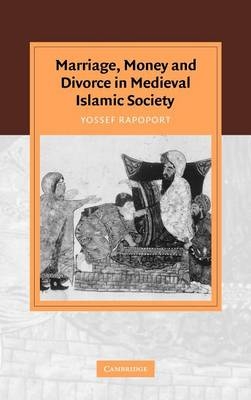
Marriage, Money and Divorce in Medieval Islamic Society
Seiten
2005
Cambridge University Press (Verlag)
978-0-521-84715-5 (ISBN)
Cambridge University Press (Verlag)
978-0-521-84715-5 (ISBN)
Yossef Rapoport explores the prevalence of divorce in medieval Islamic society. In so doing, he reveals that women possessed a surprising level of economic independence which they manipulated to initiate divorce as often as men. The book makes a significant contribution to the social history of an understudied period.
High rates of divorce, often taken to be a modern and western phenomenon, were also typical of medieval Islamic societies. By pitting these high rates of divorce against the Islamic ideal of marriage,Yossef Rapoport radically challenges usual assumptions about the legal inferiority of Muslim women and their economic dependence on men. He argues that marriages in late medieval Cairo, Damascus and Jerusalem had little in common with the patriarchal models advocated by jurists and moralists. The transmission of dowries, women's access to waged labour, and the strict separation of property between spouses made divorce easy and normative, initiated by wives as often as by their husbands. This carefully researched work of social history is interwoven with intimate accounts of individual medieval lives, making for a truly compelling read. It will be of interest to scholars of all disciplines concerned with the history of women and gender in Islam.
High rates of divorce, often taken to be a modern and western phenomenon, were also typical of medieval Islamic societies. By pitting these high rates of divorce against the Islamic ideal of marriage,Yossef Rapoport radically challenges usual assumptions about the legal inferiority of Muslim women and their economic dependence on men. He argues that marriages in late medieval Cairo, Damascus and Jerusalem had little in common with the patriarchal models advocated by jurists and moralists. The transmission of dowries, women's access to waged labour, and the strict separation of property between spouses made divorce easy and normative, initiated by wives as often as by their husbands. This carefully researched work of social history is interwoven with intimate accounts of individual medieval lives, making for a truly compelling read. It will be of interest to scholars of all disciplines concerned with the history of women and gender in Islam.
Yossef Rapoport is an associate member of the Faculty of Oriental Studies, University of Oxford.
Acknowledgements; Glossary; List of abbreviations; Introduction; 1. Marriage, divorce and the gender division of property; 2. Working women, single women and the rise of the female ribāt; 3. The monetization of marriage; 4. Divorce, repudiation and settlement; 5. Repudiation as public power; Conclusion; Bibliography; Index.
| Erscheint lt. Verlag | 21.4.2005 |
|---|---|
| Reihe/Serie | Cambridge Studies in Islamic Civilization |
| Verlagsort | Cambridge |
| Sprache | englisch |
| Maße | 160 x 235 mm |
| Gewicht | 406 g |
| Themenwelt | Sachbuch/Ratgeber ► Geschichte / Politik ► Allgemeines / Lexika |
| Geisteswissenschaften ► Religion / Theologie ► Islam | |
| Sozialwissenschaften ► Soziologie ► Mikrosoziologie | |
| ISBN-10 | 0-521-84715-X / 052184715X |
| ISBN-13 | 978-0-521-84715-5 / 9780521847155 |
| Zustand | Neuware |
| Haben Sie eine Frage zum Produkt? |
Mehr entdecken
aus dem Bereich
aus dem Bereich


